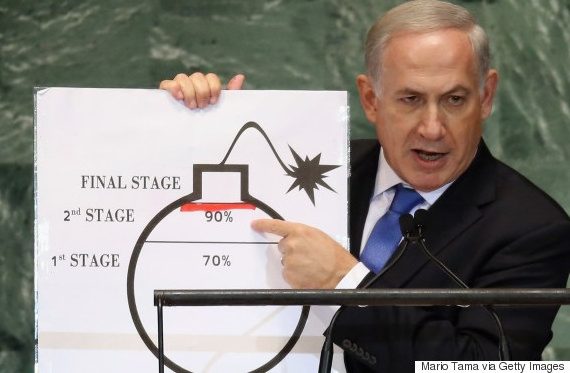This post is part of Marc H. Ellis’s “Exile and the Prophetic” feature for Mondoweiss. To read the entire series visit the archive page.
We all want regional cooperation. But when cooperation becomes collaboration we head straight to disaster.
Who benefits from Syria’s disaster? Regional cooperation in the Middle East may be the new face of Naomi Klein’s “shock doctrine.” In this version of the shock doctrine, Middle East players carve up what’s left of Syria – with the help of the great powers, of course.
Enter – stage right – the just announced jointly chaired Russian – American conference on the future of “what’s left.”
Israel is playing an interesting role in this evolving spectacle. The most obvious role is Israel’s strikes into Syria which further destabilizes the Assad regime.
There’s more.
Take Prime Minister Netanyahu’s apology to the Turkish government for the raid on the Gaza flotilla almost three years ago. The raid cost the lives of eight Turks and an American of Turkish descent and severely strained diplomatic relations between the two countries. Most observers believe that Netanyahu’s apology was less a change of heart than a mending of fences with a broader goal in mind.
The broader goal is to further isolate the Syrian regime and, as an added bonus, strengthen the Turkish and Israeli economies. According to the New York Times and Haaretz, with Syria out of commission, Turkey’s ships are docking in Israeli ports. The goods are then transported through Israel overland to Jordan, Iraq and surrounding countries.
Trade between Turkey and Israel has been exploding. In 1997, total trade was about 300 million dollars. In 2011, it reached 4 billion dollars.
In the past, trade between Turkey and Israel has mostly been defense related but this is changing. Now a higher percentage of the trade between the two countries is in commercial commodities. Israel imports textiles and minerals from Turkey. In turn, Turkey imports chemicals, agricultural equipment and seeds from Israel.
Then there is the issue of Israeli tourism. Turkey is a favorite destination for Israeli vacationers – over half a million Israeli tourists were vacationing in Turkey before the Gaza flotilla raid. With Netanyahu’s apology in the bag, Turkey hopes Israeli tourists will return.
Returning to Syria, a sentence in the Times article at first struck me as curious. Then following the article’s discussion of increased defense and economic trade between Turkey and Israel, it made perfect sense. Discussing the normalization of relations after Netanyahu’s apology, the Times offers this assessment: “But few here expect a drastic turnaround in military cooperation. More likely, an Israeli official said, was a sharing of assessments and intelligence on the Syrian issue, perhaps not bilaterally, but in a regional framework, with Jordan, presided over by the United States.”
I have argued for years that Israel’s only route for integration into the Middle East is through Palestinians. Without a just resolution of the Palestinian issue, Israel will forever be isolated, turning to the West for support and living in its “dangerous neighborhood” as a militarized pariah.
Contra my argument, what if Israel’s way into the Middle East is through its military dominance and becoming a significant cooperative player in the “stabilization” of the Middle East – without a real Palestinian state? What if instead of destabilizing the Middle East – and using Sara Roy’s terminology, de-developing it so Israel can maintain its military and economic advantage –players in the Middle East use Israel’s location, unconditional American support and its military might to do their dirty work for them?
If we play the what-if card further and concentrate on the Turkey-Israel part of this scenario as a prime example, this is where we end up: That trade with Jordan and the Arab world through Israel and Israeli tourists in Turkey are more important to Turkey than the never-to-be-resolved Palestinian “problem.” That is in real life rather than in symbolic rhetoric.
More or less, this is in line with the Arab League’s “strategic choice” regarding land swaps between Israel and the Palestinians. Like Turkey, the Arab League has are more pressing matters than Palestine. A “cooperative” Israel is more beneficial to a broader Middle East stability than resolving the Palestinian issue in terms of justice.
Have a cooperative Israel and contained Palestinian population become the strategic triage option of choice for nations in the Middle East?
This way forward is not completely new. Egypt and Jordan decided decades ago that working with Israel guaranteed European and American support for their respective power structures. If you’ve noticed, a Muslim Brotherhood president in Egypt – and the Arab Spring in general – hasn’t changed Egypt’s “strategic choice.” Jordan continues on its decades old path.
Perhaps it’s simply a matter of prioritizing.
Triaging Palestinians for stability in the Middle East.
Yes, there’s a thin line between cooperation and collaboration. But then who ever thought the governments in the Middle East – or elsewhere for that matter – had an ethical compass?


Sadly, sounds right. Shed more tears for Palestine.
That always has been the plan, I suppose, and I agree that the recent Egyptian business has been a triumph for the planners. Not so much difference between Saudi potentates and Egyptian religious enthusiasts after all. But the whole plan and idea is still crazy, isn’t it?
Success for Palestinians either in the form of a state or rights was never going to come from any government whether western or eastern. It will come from the people of those countries and as such what their governments do in the long run is immaterial. Nothing can stop the genie from Bahrain, Jordan or Saudi